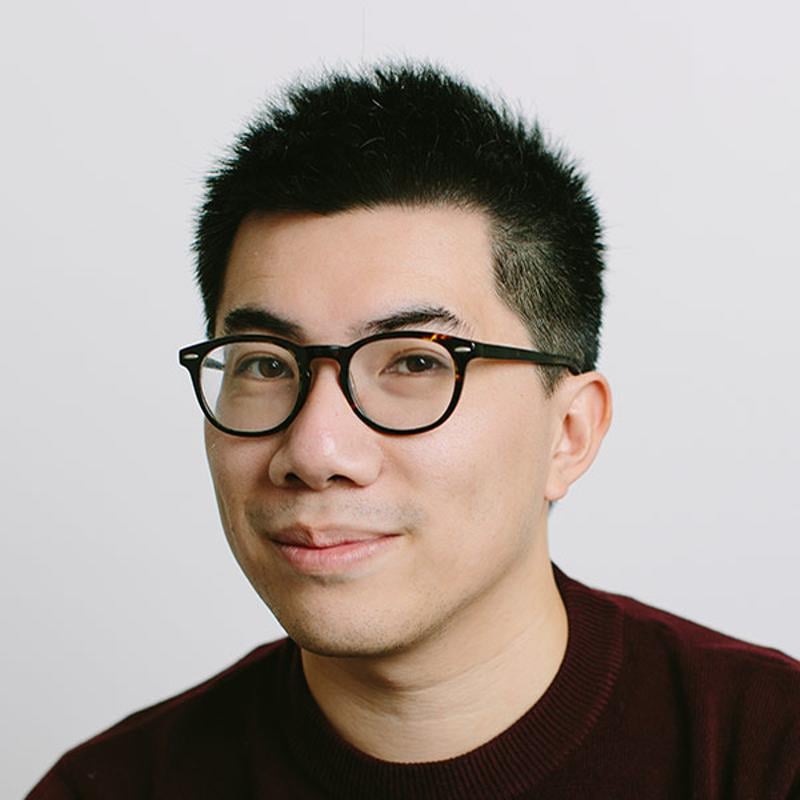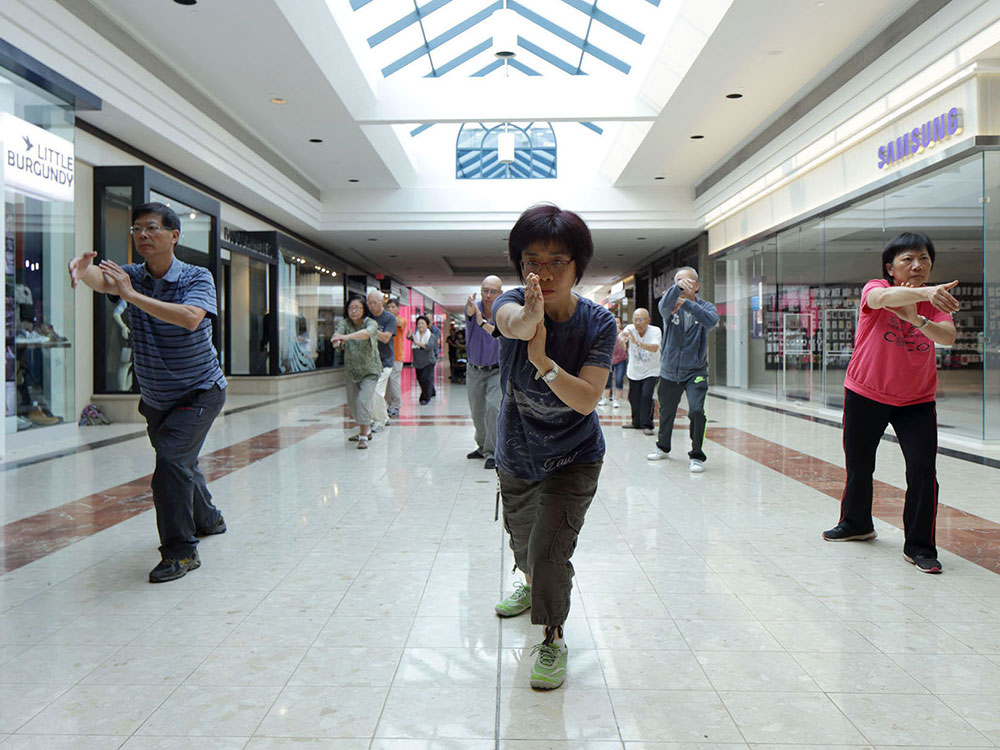Five mornings a week for almost three decades, the staff at Richmond Centre would unlock the doors to welcome hundreds of people before the shops opened. The crowd, most of them seniors, would assemble rain or shine under the skylight of the main galleria. It’s not a school or a monastery — but in a Vancouver suburb, there’s no better place than an empty shopping mall to practice tai chi.
At 8 a.m., Wei Foung Yuan was always there with his wife, even into his late 90s. He helped start these mall meetings, and the regulars respectfully and affectionately call him sifu, which in Cantonese means master. Even the Queen has honoured him with a Diamond Jubilee Medal.
From his spot by the Starbucks Yuan led the group, demonstrating tai chi and luk tung kuen — good for circulation — in front of window displays of Coach handbags and Foot Locker’s sneakers. Other volunteers then stepped in to lead dances, stretches and other low-impact workouts. It was the perfect programming for elderly suburbanites looking to get moving.
At 9:30 a.m., when the mall opened, it was off to the food court for chats over tea and coffee.
For the better part of 30 years, this was a uniquely Richmond ritual.
Called the Richmond Wellness Club, the group had about 600 members, with an average of 200 packing the mall on any given weekday. Though there are plenty of other formal and informal tai chi clubs that meet at parks and community centres across Metro Vancouver, there was nothing in the region that met regularly of this scale.
But when the pandemic hit, it meant no more meet-ups at the mall.
Members were encouraged to practise at home. But for the seniors who liked to get moving together, COVID-19 robbed them of a special community.
From machines to a master
Yuan might’ve helped found the club, but he didn’t start out a sifu. He was an engineer by trade who picked up exercises the same way he’d later teach them to others: shared in the community.
Yuan was born in Haimen, China, in 1920. Like many others from his city, he headed to the nearby metropolis of Shanghai for work. There, he met his wife and got a job at the Nanyang Cotton Mill, owned by a local industrialist.
They survived the Second World War in Shanghai, when Yuan’s factory was bombed by the Japanese. When that war ended, Yuan’s boss feared the escalating civil war in China and decided to relocate to Hong Kong in 1948. Yuan and his family followed him there. Over the years, he climbed the ranks to become mill manager.
“His work life was very intense,” said his son Henry, who remembered his father being sent to Buenos Aires for a five-year stint to help open a mill.
It wasn’t until retirement that Yuan became interested in exercise and learned tai chi from a master. He immigrated to Richmond in 1981, where his family had relocated, but made trips back to Hong Kong, where he learned and practised with other tai chi and luk tung kuen enthusiasts at Victoria Park.
The same reciprocity happened back in Richmond. When Yuan was exercising at a park with a friend, there was enough interest from locals that he began teaching a class. As the group grew, they moved into the Thompson Community Centre. It wasn’t long before it was too small to keep up with the group’s popularity.
Another friend who worked for the Heart and Stroke Foundation suggested teaming up and asking for space at one of the biggest indoor buildings in their city: the Richmond Centre shopping mall.
To their delight, the mall not only accepted, but welcomed them rent-free.
“It’s the perfect location,” said Kitty Tang, the secretary of the club, in Cantonese.
“It’s weather-proof, no need to worry about rain, snow or wind. It’s in a central part of Richmond, whether people are driving or taking transit. And it’s got the food court, where everyone can mingle afterwards.”
The club charged an annual administration fee of $10, which later rose to $15. “Think about how affordable that is if you come every day,” said Tang.
For a time, the mall even had T-shirts made for participants who’ve attended 200 sessions.
Malls might be the de facto town squares of suburbs, but they’re commercial ventures at the end of the day and don’t always tolerate the kinds of activities that take place in truly public spaces. Back in 2016, the Park Royal mall in West Vancouver threatened to have the regulars playing chess in the food court arrested, only to later reverse the decision and create a special chess area for players away from the food court.
“It feels really unique for a place like Richmond Centre to host us,” said Tang. “No rent? Just as a favour to the community? Not only that, they have to open the mall earlier, provide security guards and even help if there’s a senior who’s not feeling well. We’ve been really thankful for the partnership.”
Strangers in suburbia
The wellness club held its first session at Richmond Centre in 1992.
It showed up at the right time for a booming community. Immigration from Hong Kong to Canada reached an all-time high in the years leading up to the territory’s 1997 handover from Britain to China. Richmond was a popular destination for newcomers.
But there are a lot of challenges for immigrant seniors, many of whom moved with children and grandchildren. How to make friends? How to find things to do? How to find meaning outside of one’s family? Richmond’s sprawling landscape also makes it tough to get around for those who don’t drive.
Tang remembers first hearing about the club in 1994.
“My mother was visiting from Los Angeles,” said Tang. “My neighbour — who’s not Chinese, he’s Greek actually — suggested, ‘Why don’t you take your mom to Richmond Centre? There’s a lot of other seniors exercising there.’ Of course she loved the opportunity. That’s how a lot of people hear about the club, through word of mouth.”
The club started off with a majority of seniors with Hong Kong roots, but it’s diversified over the years with younger adults, Canadian-borns and other immigrants from places like Japan, Korea and the Philippines, with a big influx from mainland China. It was a rare space of multicultural mixing in a city that often struggles with diversity.
The friendly Yuan welcomed everyone.
“He has a very strong memory and is great with names,” said Tang. “If it’s your first time, he knows. If you’ve been doing the exercises well, he might ask you to consider being a leader.”
Yuan’s granddaughter Jen, who used to live with her grandparents growing up, remembers his warm and animated personality.
“He definitely liked to have fun,” she said. “We had a bit of a language barrier, but he always made me laugh. He liked to dance in public! He had no embarrassment or shame about that. He would even bring musical instruments to restaurants. One time, I remember him riding with my sister on the train for kids at Lansdowne [Centre] mall. Every time I went out with him, especially for dim sum, people would recognize him.”
Missing the mall
When the pandemic arrived, Tang said that they sent out exercise videos for members to follow along at home.
“But it’s not the same,” she said. “I’ve been keeping up at home too, but it’s nothing like being with everyone at the mall.”
Through the ups and downs of each wave of COVID-19, Tang ran into the club’s members at supermarkets and restaurants, who would ask if she knew when the mall would welcome them back.
She’d get calls from senior members’ adult children. “People I don’t know even know!” she said. “They tell me how much their parents miss it.”
Yuan and his wife kept up at home, doing exercises with the help of a chair to lean on.
But sadly, they wouldn’t get to return to the mall. She died in August 2020 and he followed in December 2021.
In Yuan’s obituary, his family notes that after excelling in his career, he lived a full life in retirement. They made sure the title "sifu" was right up there with his name, a testament to his teaching and the community he helped build.
Yuan had always said that health and happiness go hand in hand. He was 101 when he died.
A quiet goodbye
It turned out that none of the club’s members would be able to return to the mall either.
In March 2022, Cadillac Fairview, the Canadian company that co-owns and manages the mall, told the club that it could no longer host them. The company told The Tyee in a statement that it was a “pleasure” to partner with the club over so many years.
In typical Vancouver fashion, the reason is massive redevelopment. “The transformation of world class shopping centre into a world class master planned destination,” promise the lofty ads. Construction has already begun and will continue in phases, adding new homes and more shopping space.
The club’s leadership met in July to decide its fate. It was hard to find a venue that could replace Richmond Centre. They considered community centres, but they were too small to host the club, not to mention more expensive. Even a $2 fee per session would be unaffordable for some of their senior members, said Tang.
So with the loss of the mall, the club decided to cease operating on the year that would’ve marked its 30th anniversary.
“Even when we paused during the pandemic, our group had been growing. Maybe we would’ve run out of space anyway,” said Tang with a laugh.
Some members of the wellness club have gone on to do tai chi at various parks and Lansdowne Centre, Richmond's second largest mall. In Vancouver, you’ll find well-attended morning and evening sessions in parks like Sunrise and Slocan on the east side, with music and swords in the mix. And unlike 1992, there’s now social media to help bring people together.
Tai chi and other exercises are easier to come by these days, but Henry says his father was there during a time when it was harder for people to “find their own kind.”
Henry admits he never exercised at the mall with his parents, but he’s seen how they’ve touched the lives of so many new Richmondites looking for connection and a way to stay healthy in the suburbs.
He says with a chuckle, “I guess sometimes circumstances make heroes.” ![]()
Read more: Health, Urban Planning

















Tyee Commenting Guidelines
Comments that violate guidelines risk being deleted, and violations may result in a temporary or permanent user ban. Maintain the spirit of good conversation to stay in the discussion.
*Please note The Tyee is not a forum for spreading misinformation about COVID-19, denying its existence or minimizing its risk to public health.
Do:
Do not: